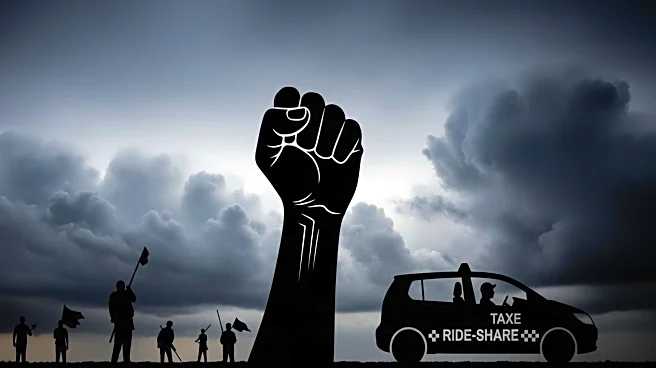What's Happening?
Protests have erupted across Indonesia following the death of a ride-share driver who was killed by a police vehicle during a demonstration. The unrest began in Jakarta and has spread to other cities, including Medan, where hundreds have gathered outside the North Sumatra Regional House of Representatives. The protests are driven by economic grievances such as unemployment, inflation, and high living costs. Demonstrators have expressed anger over new housing allowances for MPs, which are significantly higher than the minimum wage. The situation escalated after the death of the 21-year-old driver, leading to clashes between protesters and police, who have used tear gas and smoke bombs to disperse crowds.
Why It's Important?
The protests represent a significant challenge for Indonesian President Prabowo Subianto, who is under pressure to address the economic issues fueling public discontent. The demonstrations highlight widespread dissatisfaction with the government's handling of economic policies, which protesters argue have led to increased financial strain on citizens. The incident involving the ride-share driver has intensified calls for accountability and reform within the police force, as well as broader demands for economic justice. The unrest could impact Indonesia's political stability and economic outlook, as the government faces growing demands for change.
What's Next?
In response to the protests, President Subianto and the chief of police have issued public apologies, acknowledging the excessive actions of the officers involved in the driver's death. Seven police officers have been put on leave for violating the professional code of ethics. The government may need to implement policy changes to address the economic grievances and restore public trust. Continued protests and potential government responses will be closely monitored, as stakeholders assess the impact on Indonesia's political and economic landscape.
Beyond the Headlines
The protests in Indonesia underscore deeper issues related to economic inequality and governance. The public's reaction to the driver's death reflects broader concerns about police accountability and the need for reform. The situation may prompt discussions on the balance between economic growth and social welfare, as well as the role of government in ensuring equitable distribution of resources. Long-term implications could include shifts in public policy and increased scrutiny of government actions.










